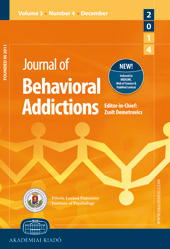Exploring the Neural Basis of Avatar Identification in Pathological Internet Gamers and of Self-Reflection in Pathological Social Network Users
Exploring the Neural Basis of Avatar Identification in Pathological Internet Gamers and of Self-Reflection in Pathological Social Network Users
Author(s): Tagrid Leménager, Julia Dieter, Holger Hill, Sabine Hoffmann, Iris Reinhard, Martin Beutel, Falk Kiefer, Karl Mann, Sabine Vollstädt-KleinSubject(s): Media studies, Cognitive Psychology, Neuropsychology, Psychology of Self, Psychoanalysis, Substance abuse and addiction, Social Informatics
Published by: Akadémiai Kiadó
Keywords: self-concept deficits; pathological Internet gaming; avatar identification; pathological social network use; striatum; angular gyrus;
Summary/Abstract: Internet gaming addiction appears to be related to self-concept deficits and increased angular gyrus (AG)-related identification with one’s avatar. For increased social network use, a few existing studies suggest striatal-related positive social feedback as an underlying factor. However, whether an impaired self-concept and its reward-based compensation through the online presentation of an idealized version of the self are related to pathological social network use has not been investigated yet. We aimed to compare different stages of pathological Internet game and social network use to explore the neural basis of avatar and self-identification in addictive use. Methods: About 19 pathological Internet gamers, 19 pathological social network users, and 19 healthy controls underwent functional magnetic resonance imaging while completing a self-retrieval paradigm, asking participants to rate the degree to which various self-concept-related characteristics described their self, ideal, and avatar. Self-conceptrelated characteristics were also psychometrically assessed. Results: Psychometric testing indicated that pathological Internet gamers exhibited higher self-concept deficits generally, whereas pathological social network users exhibit deficits in emotion regulation only. We observed left AG hyperactivations in Internet gamers during avatar reflection and a correlation with symptom severity. Striatal hypoactivations during self-reflection (vs. ideal reflection) were observed in social network users and were correlated with symptom severity. Discussion and conclusion: Internet gaming addiction appears to be linked to increased identification with one’s avatar, evidenced by high left AG activations in pathological Internet gamers. Addiction to social networks seems to be characterized by emotion regulation deficits, reflected by reduced striatal activation during self-reflection compared to during ideal reflection.
Journal: Journal of Behavioral Addictions
- Issue Year: 5/2016
- Issue No: 3
- Page Range: 485-499
- Page Count: 15
- Language: English

